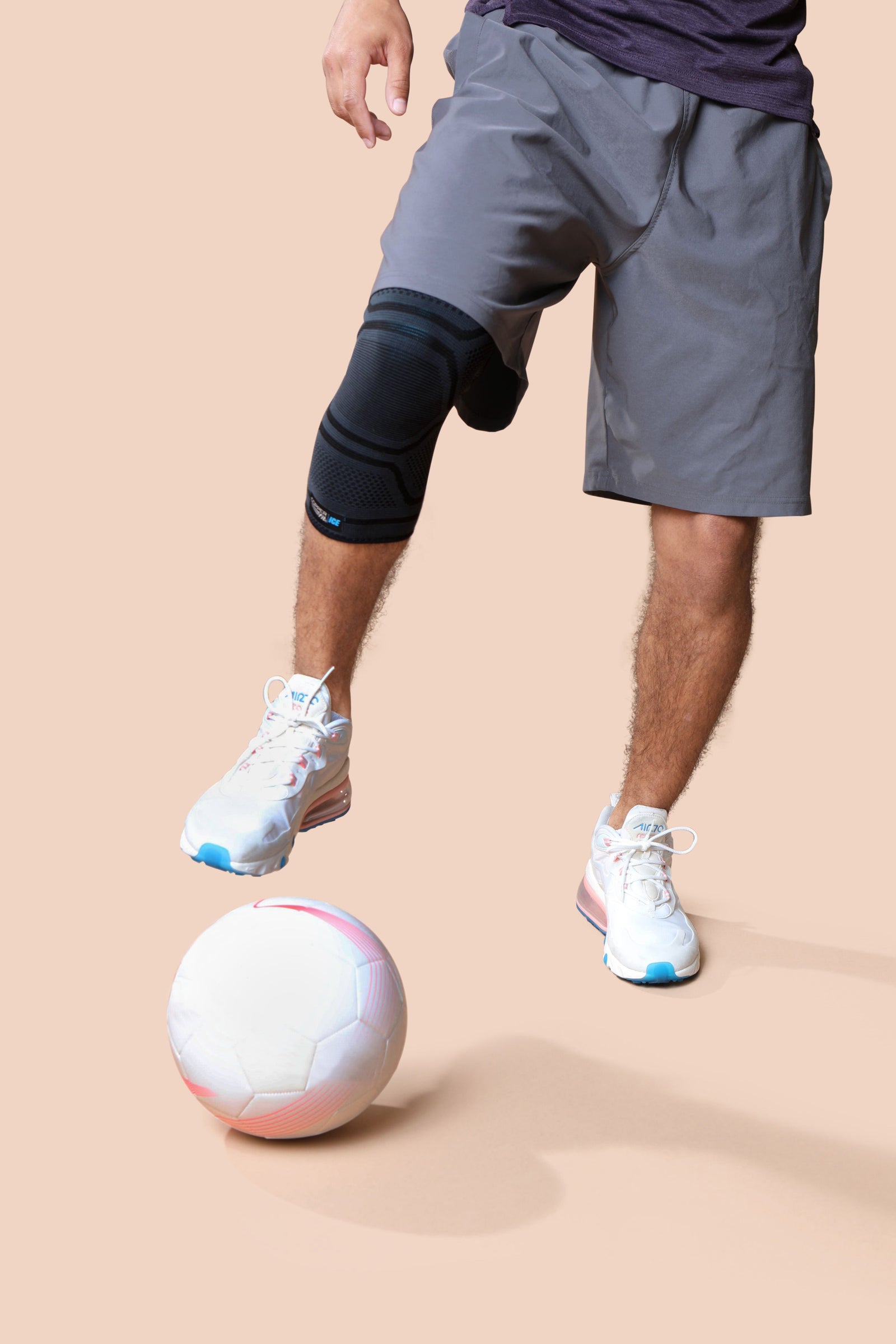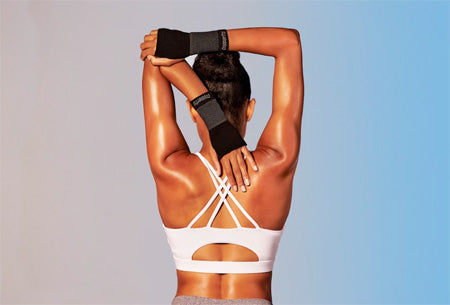
Rounded shoulders, a common posture problem, can significantly impact your overall health and well-being. Characterized by the forward positioning of the shoulders, this condition often results from poor habits developed over time.
Understanding the causes and risk factors associated with rounded shoulders is the first step toward prevention and correction.
What Are Rounded Shoulders?
Rounded shoulders, often referred to as kyphosis or "computer posture," is a postural condition where the shoulders are positioned forward rather than aligning vertically over the joints. This condition is increasingly common in today's digital age, with many of us spending hours hunched over computers and mobile devices.
The forward positioning of the shoulders is typically accompanied by a forward head posture and a hunched upper back, creating a rounded appearance that gives the condition its name. This posture problem can stem from long-term poor posture habits that gradually lead to changes in the musculoskeletal structure of the upper body.
Over time, these habits can lead to muscle imbalances, with the chest muscles becoming tight due to constant contraction and the upper back muscles becoming weak due to underuse. As a result, the natural alignment of the shoulders shifts, leading to the characteristic rounded shoulder posture.
While it may seem like a minor issue, rounded shoulders can have substantial impacts on your health. Some of the potential health implications include:
-
Neck and back discomfort: The strain of maintaining a rounded posture can lead to chronic discomfort in the neck and back.
-
Reduced mobility: The altered posture can limit the range of motion in your shoulders and upper back.
-
Breathing difficulties: The forward position of the shoulders can compress the chest cavity, potentially affecting your ability to breathe deeply. This can lead to increased anxiety as well.
What Causes Rounded Shoulders?
Rounded shoulders are typically caused by a combination of factors that encourage poor posture and lead to muscle imbalances.
Here are some of the primary causes:
- Poor Posture Habits: Habitual slouching while sitting or standing can lead to rounded shoulders over time. This is especially common among office workers, students, and any profession that involves spending long hours sitting at desks.
- Sedentary Lifestyle: A lack of physical activity can cause a host of physical issues, including the potential weakening of the muscles that support good posture, leading to muscle imbalances and rounded shoulders.
- Muscle Imbalances: Overly tight chest muscles coupled with weak upper back muscles can pull the shoulders forward, resulting in a rounded posture. Sometimes, this can be caused by overfocusing on particular muscular groups instead of working muscles evenly.
- Aging: As we age, there’s a heightened risk of developing rounded shoulders due to natural changes in muscle mass and bone density.
What Are the Risk Factors for Developing Rounded Shoulders?
Certain lifestyle factors and habits can increase the likelihood of developing rounded shoulders. Being aware of these risk factors can help you make informed decisions about your posture and overall health.
Here are some key risk factors:
- Prolonged Sitting or Standing: Spending long hours in a sitting or standing position, especially with poor posture, can lead to muscle fatigue and encourage the development of rounded shoulders.
- Improper Workout Techniques: Improper form or technique during workouts, particularly when performing upper body exercises, can contribute to muscle imbalances that lead to rounded shoulders.
- Certain Occupations or Activities: Jobs or activities that involve prolonged periods of sitting at a desk, driving, or bending forward can increase the risk of developing rounded shoulders.
By recognizing these risk factors, you can take proactive steps to prevent rounded shoulders, such as regular breaks from sitting, proper workout techniques, and ergonomically designed workstations.
How Can Rounded Shoulders Impact Your Health?
Rounded shoulders can lead to a host of health issues, some of which can significantly affect your quality of life.
The misalignment caused by this condition places extra strain on certain parts of your body, leading to a range of potential health impacts:
Back and Neck Pain
When your shoulders are rounded forward, your neck and back muscles have to work harder to keep your body upright. This added strain can lead to chronic discomfort in these areas, which may interfere with your daily activities and overall well-being.
Reduced Mobility
Over time, the altered posture associated with rounded shoulders can limit the range of motion in your shoulders and upper back. This reduced mobility can make it more difficult to perform certain tasks or activities, from reaching for objects on high shelves to participating in sports or exercises that require a wide range of shoulder movement.
Increased Risk of Injury
The muscle imbalances associated with rounded shoulders can make you more susceptible to injuries, particularly during physical activities or workouts. For example, if your chest muscles are tight and your back muscles are weak, you might be more likely to experience strains, sprains, or other injuries.
Breathing Difficulties
Rounded shoulders can also affect your breathing. When your shoulders roll forward, it can compress your chest cavity, reducing the space available for your lungs to expand. This can make it harder for you to take deep, full breaths, which can lead to feelings of breathlessness or fatigue, especially during physical exertion.
How Can You Prevent or Correct Rounded Shoulders?
Preventing or correcting rounded shoulders involves a combination of lifestyle modifications and specific exercises designed to strengthen weak muscles and stretch tight ones.
Here are some practical strategies:
Maintain Good Posture
Try to be mindful of your posture throughout the day, whether you're sitting at your desk, standing in line, or even walking. Generally, aim to keep your shoulders aligned over your hips, your chest open, and your head upright. Walk with confidence, regularly checking your posture, which can help you identify and correct any tendencies towards rounding your shoulders.
Regular Physical Activity
Incorporate regular physical activity into your routine. Activities like swimming, yoga, and Pilates can help improve posture by strengthening your core and upper body muscles. These activities also promote flexibility, which can help correct muscle imbalances that contribute to rounded shoulders.
Strength Training
Specific exercises can strengthen the muscles in your upper back and shoulders, helping to correct rounded shoulders. Examples include reverse dumbbell flys, shoulder blade squeezes, and rows. Incorporating these exercises into your workout routine can help counteract the effects of prolonged sitting or standing.
Stretch Regularly
Regular stretching can help alleviate tightness in the chest muscles, a common issue in people with rounded shoulders. Chest stretches and doorway stretches are particularly effective. Making stretching a part of your daily routine can help improve your posture and prevent the development of rounded shoulders.
Ergonomic Workstations
If you spend long hours at a desk, make sure your workstation is set up to support good posture. Your computer monitor should be at eye level, your keyboard and mouse should be within easy reach, and your chair should support your lower back.
How Can Compression Gear Support Your Posture?
Compression gear can provide support to your muscles and joints during physical activities and workouts. Copper Fit offers a range of products that can support your efforts to maintain or improve your posture. While not a cure for rounded shoulders, utilizing these products can be a valuable part of a comprehensive approach to improving your posture.
It’s important to always consult with a healthcare professional for a personalized plan to prevent or correct rounded shoulders.
Helping Shoulder the Weight
Addressing rounded shoulders is crucial for maintaining good health and preventing potential complications such as chronic pain or reduced mobility. By understanding the causes and risk factors associated with rounded shoulders, you can take proactive measures to prevent or correct this common posture problem.
Regular physical activity, strength training, stretching, and maintaining good posture throughout the day are all key elements in this process. Copper Fit can play a supportive role in your path toward better posture, providing added support during your physical activities.
By taking a comprehensive approach to your posture and overall health, you can look forward to improved well-being and a higher quality of life.
Sources:
Guide to Good Posture: MedlinePlus
The Healthy: Four Signs You Have a Muscle Imbalance | Cedars Sinai





